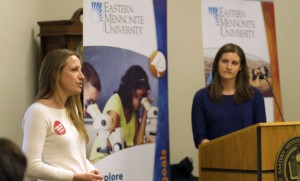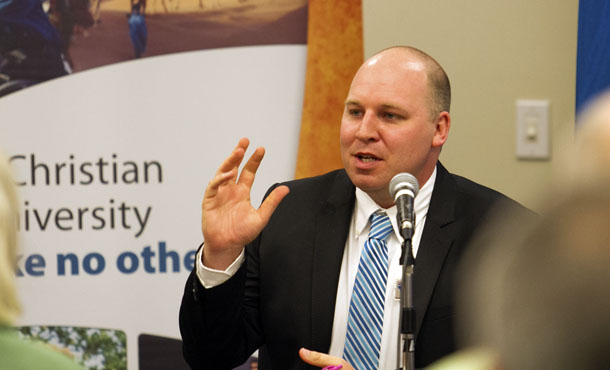A new campaign highlighting steps taken by institutions and local governments across Virginia to cut carbon emissions brought a crowd to Eastern Mennonite University for a panel discussion on the university’s sustainability initiatives.
The Virginia Acts on Climate Campaign chose EMU because of its dedication to environmental sustainability, said Kate Addleson, program manager for the Virginia Chapter of the Sierra Club, one of the partners in the campaign.

“We really appreciated the holistic approach that EMU has to sustainability,” said Addleson, who hopes to see other universities in Virginia emulate what she described as EMU’s pioneering and precedent-setting leadership on the issue.
The event, held on Earth Day in late April, featured a panel of EMU faculty, staff and president Loren Swartzendruber, DMin, speaking to a crowded room in the Campus Center.
“For us, it is a faith issue to take care of God’s creation,” said Swartzendruber.
Motivated by a theological commitment to care for the needy, he said, EMU has been prioritizing sustainability for decades to try to limit resource consumption to its fair global share. As a result, EMU’s buildings now consume significantly less energy per square-foot and per student than the average among its peer institutions.
Since 2000, efficiency upgrades on campus have allowed the university to save 46 million kilowatt-hours of electricity and $2.5 million on its utility bills, according to sustainability coordinator Jonathan Lantz-Trissel. (The figures are based on a comparison to energy consumption levels in 2000.)
One of the most significant recent sustainability projects was the 2010 installation of a 104-kilowatt solar array on the roof of the Hartzler Library. It was the state’s largest commercial solar power project at the time. Its innovative financing agreement has been the basis for statewide legislation designed to promote growth of Virginia’s solar energy sector. The solar project was developed in partnership with Secure Futures LLC, a solar energy company led by EMU business professor and MBA program co-director Tony Smith, who also spoke on the panel.
The university worked with the City of Harrisonburg to pass an ordinance exempting the solar panel equipment from the local machinery and tools tax – another move that set precedent for recent state legislation.
Just three and a half years into their decades-long lifespan, the solar panels on the library roof have generated more than 450,000 kWh of electricity, offsetting the consumption of more than 266 barrels of oil. The average annual output of the library array is roughly equivalent to the annual energy use of 10 homes in Virginia. See live data on the solar array at emu.edu/solar
Earlier this year, the university was awarded a silver ranking by the Association for the Advancement of Sustainability in Higher Education, based on its sustainability initiatives in operations, curriculum, planning and other areas. EMU is one of seven universities in Virginia with a silver ranking. Four others universities have earned bronze rankings, while none have a gold certification.
Also speaking on the panel was Lisa Schirch, PhD, a research professor at EMU’s Center for Justice and Peacebuilding. She discussed her approach to sustainability as a peacebuilding issue by describing the growing link between climate change and violent conflict around the world.
Biology professor Jim Yoder, PhD, provided an overview of EMU’s environmental sustainability major, an interdisciplinary program that combines environmental and social sciences. Launched just five years ago, enrollment has grown rapidly to more than 40 students, making it one of EMU’s 10 most popular majors.
Kai Degner, a city councilman and former Harrisonburg mayor, also spoke. He complimented EMU for demonstrating the environmental and economic benefits of large-scale sustainability initiatives, and said that the university “really provides us a terrific local example” for government, institutions, businesses and citizens to pursue similar projects.
More on sustainability at EMU:
Sustainability and creation care at EMU
Major in environmental sustainability
